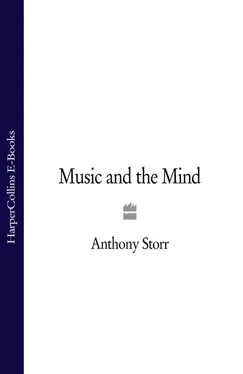Plato, who was not averse to strict censorship, wanted to banish from the ideal State styles of music which were sorrowful, plaintive or associated with indolence and drinking. There were only two styles which should be tolerated: one for use in battle or in times of misfortune, when a man’s resolve might need boosting; the other to be used in times of peace, when he is either seeking to persuade God or man in moderate fashion, or else himself is yielding to persuasion in an equally balanced way. Such music might be used to represent his prudence and moderation.
These two harmonies I ask you to leave; the strain of necessity and the strain of freedom, the strain of the unfortunate and the strain of the fortunate, the strain of courage, and the strain of temperance; these, I say, leave. 29
As Glaucon points out, this leaves only the Phrygian and Dorian modes from amongst those in common use. The term ‘mode’ as employed by the Greeks is difficult to define exactly in modern terms, for it referred both to the scale and also to the type of melody; but the general sense is clear enough.
Aristotle believed that,
men are inclined to be mournful and solemn when they listen to that which is called Mixo-Lydian; but they are in a more relaxed frame of mind when they listen to others, for example the looser modes. A particularly equable feeling, midway between these, is produced, I think, only by the Dorian mode, while the Phrygian puts men into a frenzy of excitement. 30
Indeed, Aristotle thought Socrates wrong to permit the Phrygian mode to be added to the Dorian, because he believed it to be too orgiastic and emotional. For educational purposes, he recommended the Lydian mode because of its power to combine orderliness with educative influence.
The Phrygian mode, according to the great classical scholar E. R. Dodds, was used both in the Dionysiac rituals of the Archaic Age and later in the Corybantic rituals of the fifth century BC. Both seemed to have been based upon the notion of ‘catharsis’: that is, upon the idea that individuals could be purged of irrational impulses or cured of madness if they temporarily lost all inhibitions and ‘let go’ in an ecstatic fashion. 31
Plato was conservative as well as severe. Socrates says that it was necessary that
music and gymnastic be preserved in their original form, and no innovation made… for any musical innovation is full of danger to the whole State, and ought to be prohibited. So Damon tells me, and I can quite believe him – he says that when modes of music change, the fundamental laws of the State always change with them. 32
We may not share the Greek view that particular modes have different effects upon listeners. But we recognize that some composers habitually select certain keys when they want to express particular emotions. It is generally agreed that Mozart used G minor to express tragedy or melancholy; for example, the Piano Quartet K. 478, the String Quintet K. 516, the Symphonies K. 183 and K. 550. Perhaps the Greek idea of linking certain modes with particular emotions is not so far from our own perceptions as at first appears.
Plato anticipated, or perhaps invented, the notion of mens sana in corpore sano which became the supposed aim of English public school education. What was needed was a proper balance between the physical and mental. He believed that those who simply pursued athletics became violent and uncivilized, whilst those who only exposed themselves to music became soft and feeble. Plato suggested that there are two principles of human nature, the spirited and the philosophical, which are served by gymnastics and music respectively.
And he who mingles music with gymnastic in the fairest proportions, and best attempers them to the soul, may be rightly called the true musician and harmonist in a far higher sense than the tuner of the strings. 33
Centuries later, the historian Edward Gibbon makes use of a similar dichotomy. Indeed, he may have learned it from Plato.
There are two very natural propensities which we may distinguish in the most virtuous and liberal dispositions, the love of pleasure and the love of action… To the love of pleasure we may therefore ascribe most of the agreeable, to the love of action we may attribute most of the useful and respectable qualifications. The character in which both the one and the other should be united and harmonized would seem to constitute the most perfect idea of human nature. 34
Plato wrote in the Timaeus :
All audible musical sound is given us for the sake of harmony, which has motions akin to the orbits in our soul, and which, as anyone who makes intelligent use of the arts knows, is not to be used, as is commonly thought, to give irrational pleasure, but as a heaven-sent ally in reducing to order and harmony any disharmony in the revolutions within us. Rhythm, again, was given us from the same heavenly source to help us in the same way; for most of us lack measure and grace. 35
Theon of Smyrna, a Platonist who flourished between AD 115 and 140, left a treatise concerning arithmetic, astronomy, and the theory of musical harmony which he called ‘Mathematics useful for reading Plato’.
The Pythagoreans, whom Plato follows in many respects, call music the harmonization of opposites, the unification of disparate things, and the reconciliation of warring elements… Music, as they say, is the basis of agreement among things in nature and of the best government in the universe. As a rule it assumes the guise of harmony in the universe, of lawful government in a state, and of a sensible way of life in the home. It brings together and unites. 36
It goes without saying that Plato and Aristotle were two of the most intelligent men who have ever lived. Their view of the physical universe has been superseded by modern scientific discoveries, as has that of Newton. But music and art are in a different category. Unlike science, art is not superseded, and nor are views about its meaning and significance. The great music of the past is great today. Bach’s Mass in B minor has not been displaced by Beethoven’s Missa Solemnis. Bartók’s quartets have not supplanted those of Beethoven. Modern masterpieces of music enlarge our sensibilities; but they do not surpass or replace those masterpieces which have preceded them. The views of Plato and Aristotle on music and the other arts are not outdated. They are not like theories about the physical world which can be proved or disproved. They are as worthy of critical appraisal today as they were when they were first formulated. Although scientific discovery has displaced the Greek view of the universe, the Greek perception of music may have been nearer the truth than our own.
Music is so freely available today that we take it for granted and may underestimate its power for good or ill. The idea that some modes should be forbidden and others encouraged may make us smile. In Britain, we cannot imagine our rulers banning a scale or key, partly because we would think this an unwarranted interference with personal liberty, but also because, as I suggested in the introduction, music is seldom taken seriously by politicians and educationalists who are not themselves musicians. This is not always the case elsewhere. Allan Bloom’s well-known attack on American education, The Closing of the American Mind , contains a chapter on music in which the author expresses considerable anxiety about the effect which rock music has upon students. Bloom recognizes that great music is powerfully educative, and fears that rock has banished any interest in, or feeling of need for, any other kind of music.
In Stalin’s Russia, contemporary European music, including jazz, was virtually banned, and Russian composers were subjected to many restrictions and a flood of instructions. Shostakovich’s opera The Lady Macbeth of Mtsensk was banned in 1936, and the composer wisely withheld a number of other works which he feared would not conform to the dictates of ‘socialist realism’. Although such censorship is deplorable, it does imply some recognition of the power and importance of music in the lives of ordinary people.
Читать дальше












